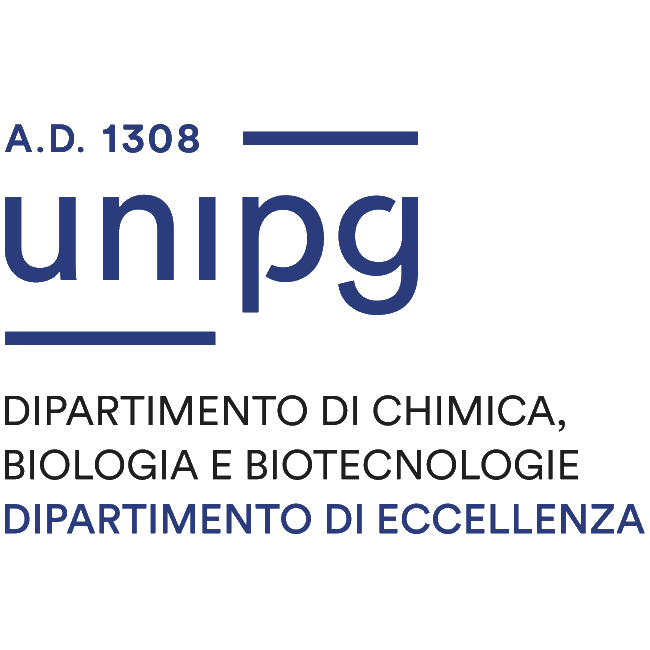Biochemical and Biotechnological Sciences (Coordinator Prof. C. Emiliani)
Research outlines:
Biochemical and molecular biology approaches for investigating physiological and pathological mechanisms underlying cancer, infectious and neurodegenerative diseases; identification of risks and protective factors for the prevention of chronic degenerative diseases related to aging; innovative bio-based materials and biocatalysis for sustainable development in the context of circular economy and green chemistry.
Reasearch Group Members:
Sandra Buratta (Researcher)
Manlio Di Cristina (Associate Professor)
Roberto Fabiani (Associate Professor)
Ermanno Federici (Researcher)
Paolo Gorello (Ric. TDB)
Sabata Martino (Associate Professor)
Roberto Maria Pellegrino (Technician)
Serena Porcellati (Researcher)
Patrizia Rosignoli (Associate Professor)
Brunella Tancini (Researcher)
Lorena Urbanelli (Associate Professor)
Biotechnology Translational research: from bench to biomedical applications
- Biochemical and molecular characterization of native and recombinant lysosomal enzymes produced by stem cells and gene therapy technology for the development of therapeutic strategies for the lysosomal metabolic storage diseases, in particular GM2-Gangliosidosis, Metachromatic Leukodystrophy, and Krabbe disease.
- Development of biochemical assays (GCP, IS09001:2015) for monitoring the expression of target proteins in treaded and healthy biological samples (e.g. cerebrospinal fluid).
- Identification of molecular pathways (e.g. microRNAs expression; mechanotransduction signaling; autophagy) associated with the progression of neurodegenerative diseases involving cellular storage materials, for developing diagnostic tools and innovative therapeutic strategies.
- Development of stem cell - biomaterials systems for identifying molecular pathways dictating phenotypical reprogramming of stem cells for selected biomedical applications.
- In silico Protein and RNA Modeling: folding prediction; in silico mutagenesis; interaction modeling with a target molecule; molecular docking and molecular dynamics.
- Multivariate analysis and Machine Learning approaches for the study of the metabolic pathways in health and disease.
Translational research and identification of new genetic markers
- Molecular characterization of new genetic markers in patients affected by hemoglobinopathies, cancer, hereditary hemocromatosis and other blood diseases.
- DNA sequencing with Sanger and NGS methods.
Enzyme Immobilization on innovative materials
- Development of therapeutic strategies based on the use of immobilized enzymes for the therapy of lysosomal storage diseases.
- Conversion of agri-food waste in valuable products for agriculture and animal breeding.
- Isolation of bio-active molecules from agri-food wastes and/or by-products for nutraceutical and food industry
Extracellular Vesicles (EVs): from intracellular trafficking to nanomedicine
- Biochemical and biophysical characterization of EVs isolated by in vitro cell models and biological fluids (plasma, serum, saliva, urine).
- EV-mediated cell signalling and biological effects exerted by EVs on target cells.
- Study of molecular content of EVs released under autophagic-lysosomal impairment conditions.
- EV labeling using recombinant fluorescent constructs (EGFP-CD63 e mCherry-CD63).
Metabolomic and phospholipidomic analyses
- Comprehensive metabolomic and phospholipidomic profiling of biological fluids, tissues, cells and Extracellular Vesicles by LC/MS-MS (Mass Spectrometer Agilent 6530 Accurate Q-TOF combined with UPLC 1290 Infinity).
- Study of lipid-mediated signaling pathways and gene/proteins expression of phospholipid-related enzymes in physiological and pathological conditions.
Identification and characterization of autophagic pathway in Toxoplasma gondii
- In silico identification of genes encoding proteins potentially involved in the formation and regulation of T. gondii autophagosomes. Tagging with fluorescent markers (GFP or mCherry) of the genes identified by bioinformatics analysis using CRISPR/Cas9 technology and analysis of the sub-cellular localization of the tagged proteins by fluorescence microscopy.
- Generation of T. gondii knock-out cell lines in which the genes involved in the autophagic process have been deleted; phenotype analysis
- Identification of compounds capable to specifically block the autophagic process of T. gondii in order to induce the degeneration of T. gondii cysts typical of the chronic phase of the disease.
Prevention of chronic-degenerative diseases
- Study of Mediterranean diet components, environmental pollutants and genetic susceptibility effects on the molecular mechanisms (e.g. DNA damage, gene expression, oxidative stress, apoptosis, proliferation, inflammation) responsible for the onset of chronic-degenerative disease.
Study of interactions between environment, lifestyle, genetics and human health
- Identification of biomarkers of exposition and effect (DNA damage, oxidative stress, inflammation, proliferation, apoptosis).
- Isolation and identification of bioactive compounds from foods and agri-food wastes and characterisation of their chemopreventive functions by an in vitro digestion model to avoid test on animal models.
- Meta-analysis studies on association between chronic degenerative diseases and diet.
Applied and environmental microbiology
- Implementation of cultural and molecular-based approaches to investigate microbial diversity and functions in natural and built environment (e.g., soil, water, air), in biotechnological processes (e.g., bioremediation and disinfection) and in human health (e.g., Legionella, SARS-CoV).


